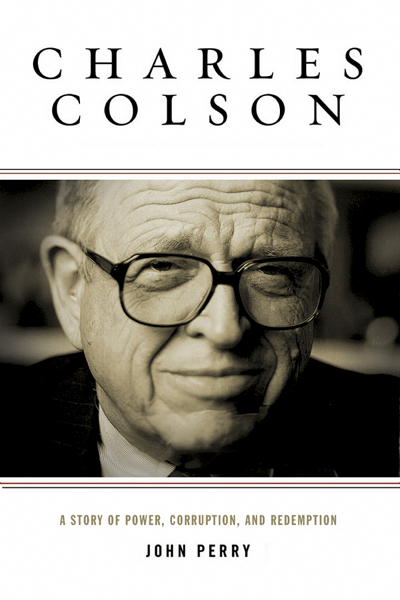
NASHVILLE, Tenn. (BP)–The Washington Post called him “Nixon’s Hatchet Man.”
In 1972, Charles “Chuck” Colson was special counsel to President Richard Nixon and considered one of the most powerful men in America, with a reputation for getting things done no matter what the cost.
When the Watergate scandal broke in 1972, the ensuing trials changed his life forever — turning the hardnosed Colson into a prisoner and a new Christian who would later form a ministry called Prison Fellowship.
John Perry’s new biography, “Charles Colson: A Story of Power, Corruption and Redemption” chronicles the spiritual transformation that helped the “Hatchet Man” find God’s greater purpose for his life in the midst of tragedy and chaos.
And Perry has a deeper purpose for writing his book: To show a shining example of Christianity “in culture.”
“I think (Charles Colson) is a great Christian,” Perry said. “He’s an example of working as a Christian in the culture and not being separated from it. These days you have Christian books and Christian music. But Christianity ought to be infused into the culture. Colson is one of those people who has infused the culture with Christianity.”
Perry, an award-winning advertising copywriter, has written several books on diverse subjects, including “Unshakable Faith,” an Evangelical Christian Publishers Association (ECPA) Gold Medallion finalist; “Sergeant York: His Life, Legend, and Legacy”; and “Lady of Arlington.”
Perry had not met Colson personally before the idea for the biography — which is the only one written about Colson — but was impressed with his deep conversion experience and life changes.
“Out of the national horror and personal tragedy of Watergate, Charles Colson built a prison ministry that has touched the lives of millions,” Perry said. “As he is the first to admit, only God could make a prisoner who hated the sights and stench and brutality of prison return as a visitor within a week of his release. Only God could turn Chuck Colson, prisoner, into Chuck Colson, prison evangelist.”
Published by Broadman & Holman, the trade book division of LifeWay Christian Resources of the Southern Baptist Convention, Perry’s book is the first thorough account of Colson’s early years — which he considers essential to a full recognition of Colson’s life.
“The more we can understand the man Charles Colson was, the more we can appreciate the man he is,” Perry said.
Using interviews with Colson and personal research (such as private papers at Wheaton College and the Nixon presidential papers at the National Archives), Perry followed Colson’s life — beginning briefly with his childhood and early life — through the Marines, Navy, politics and a six-figure income.
Colson landed his dream job in 1969 — along with a huge pay cut. As one of four special aids to President Nixon, he was named the liaison between outside interest groups and inside policy makers.
Then “The New York Times” published portions of the Pentagon Papers, a top-secret report on America’s involvement with Vietnam, and revealed that U-2 surveillance planes had flown secret assignments over China.
Nixon assigned Colson, his go-getter, to form a group to prevent such sensitive leaks in the future. Colson tapped Howard Hunt and G. Gordon Liddy for the job. All the while, Perry reported, Colson had no clue that every meeting and presidential phone call were being tape-recorded, incriminating them all. Then came the Watergate scandal — and heads began to roll.
Through his book, Perry said he hopes to clear up a big misconception about Colson: that he went to prison because of Watergate.
“That’s not true,” Perry said. “He went to prison because of the Pentagon Papers, and was cleared of the indictments regarding Watergate. The tapes show Colson wasn’t invited to those meetings.”
Another misconception Perry hopes to clear up involves Colson’s conversion. His was not a “jailhouse conversion” as most people think, Perry said.
Before the trials and indictments in Washington, Colson didn’t talk about faith much, Perry said. But when everything broke loose, a friend showed him a copy of C.S. Lewis’ “Mere Christianity” — and Colson just “broke down.”
“Nixon’s Hatchet Man was reduced to a blubbering baby because of his realization of his own need for Christ,” Perry said.
The ensuing articles and political cartoons that poked fun at Colson’s newfound faith showed just how drastically his life had changed, Perry said — and critics suspected he would use his faith as a crutch.
“He knew many people were convinced that his (new-found) Christianity was a sham, a scheme to get him out of his Watergate jam,” Perry wrote in his book. “On Monday, June 3, 1974, Colson entered a Washington courtroom and pleaded guilty to influencing, obstructing and impeding the outcome of the Daniel Ellsberg trial.”
Colson became Prisoner 23226 at Maxwell Air Base in Montgomery, Ala., lost his Virginia law license and his right to vote. But he was convinced that God had placed him at Maxwell for a higher purpose — starting with Colson’s founding of Prison Fellowship after his pardon in 1975.
“With the incorporation of Prison Fellowship, Colson could see what a miracle God had worked in his life,” Perry wrote. “Out of his selfishness, mistakes and brokenness, God fashioned a ministry unlike any other and had given him the passion to carry it forward.”
–30–
(BP) photo posted in the BP Photo Library at https://www.bpnews.net. Photo title: COLSON BIOGRAPHY.















